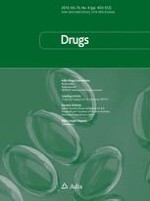01-10-2006 | Adis Drug Profile
Panitumumab
In the Treatment of Metastatic Colorectal Cancer
Published in: Drugs | Issue 15/2006
Login to get accessAbstract
-
▴ Panitumumab is a fully human immunoglobulin G2 monoclonal antibody highly selective for the epidermal growth factor receptor (EGFR), which is overexpressed in 25–77% of colorectal cancers. This overexpression is frequently associated with a poor prognosis.
-
▴ In a large, randomised, nonblind, multicentre phase III study in pretreated adult patients with metastatic colorectal cancer and EGFR staining in ≥1% tumour cells, panitumumab 6 mg/kg every 2 weeks plus best supportive care (BSC) was significantly (p < 0.0001) more effective in improving progression-free survival than BSC alone; recipients of panitumumab plus BSC had a 46% lower disease progression rate than those receiving BSC alone after a median follow-up of 19 weeks.
-
▴ Panitumumab 6 mg/kg every 2 weeks or 2.5 mg/kg/week, administered as monotherapy, produced partial response rates of 8–13% and stable disease rates of 21–30% in pretreated patients with metastatic colorectal cancer in three noncomparative, multicentre phase II studies.
-
▴ Preliminary phase II results also suggest a potential role for panitumumab as first-line therapy in combination with fluorouracil, folinic acid and irinotecan in patients with metastatic colorectal cancer.
-
▴ Panitumumab was generally well tolerated. Grade 3/4 skin-related toxicities were reported in 14% of patients receiving panitumumab plus BSC in the phase III study (versus 0% of patients receiving BSC alone). An analysis of pooled data found that high-affinity binding antibodies to panitumumab were detected in <1% of patients.





